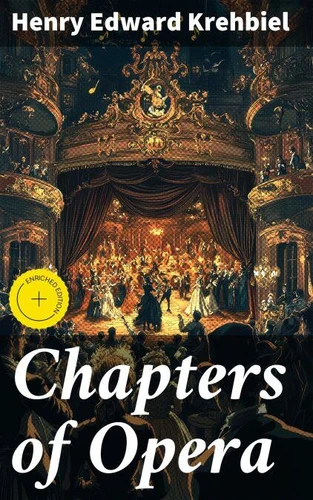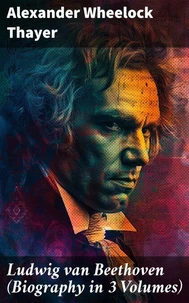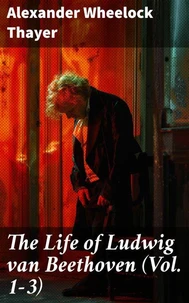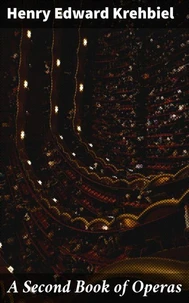Chapters of Opera. Enriched edition. Being historical and critical observations and records concerning the lyric drama in New York from its earliest days down to the present time
Par : ,Formats :
Disponible dans votre compte client Decitre ou Furet du Nord dès validation de votre commande. Le format ePub est :
- Compatible avec une lecture sur My Vivlio (smartphone, tablette, ordinateur)
- Compatible avec une lecture sur liseuses Vivlio
- Pour les liseuses autres que Vivlio, vous devez utiliser le logiciel Adobe Digital Edition. Non compatible avec la lecture sur les liseuses Kindle, Remarkable et Sony
 , qui est-ce ?
, qui est-ce ?Notre partenaire de plateforme de lecture numérique où vous retrouverez l'ensemble de vos ebooks gratuitement
Pour en savoir plus sur nos ebooks, consultez notre aide en ligne ici
- Nombre de pages401
- FormatePub
- ISBN406-4-06-615016-7
- EAN4064066150167
- Date de parution19/12/2019
- Protection num.Digital Watermarking
- Taille1 Mo
- Infos supplémentairesepub
- ÉditeurGOOD PRESS
Résumé
In "Chapters of Opera, " Henry Edward Krehbiel intricately weaves a historical and analytical exploration of opera, delving into its evolution and cultural significance. With a keen literary style that marries scholarly rigor and accessible prose, Krehbiel examines pivotal moments in opera's history, illuminating the interplay between music and drama. His keen insights into notable composers and their works contribute to a contextual landscape that captures the complexity of operatic art, serving both scholars and enthusiasts alike.
This book stands as a critical canon within the broader literary discourse of musicology and performing arts, emphasizing the symbiotic relationship between operatic storytelling and its historical underpinnings. Krehbiel, an eminent musicologist of the early 20th century, drew from his extensive background in both music and journalism, enriching his narrative with insightful observations. His passion for opera was not only a professional endeavor but deeply personal, reflecting a lifelong engagement with the art form.
His firsthand experience in the musical community allows readers to appreciate the nuanced perspectives he brings, informed by both critical analysis and aesthetic appreciation. For music lovers, scholars, and theatre aficionados, "Chapters of Opera" is an indispensable resource that transcends mere academic inquiry. It invites readers on a journey through the enchanting world of opera, equipping them with the knowledge to understand its intricate artistry.
Krehbiel's engaging narration and profound insights make this work an essential companion for anyone seeking to deepen their appreciation of operatic history. In this enriched edition, we have carefully created added value for your reading experience: - A succinct Introduction situates the work's timeless appeal and themes. - The Synopsis outlines the central plot, highlighting key developments without spoiling critical twists. - A detailed Historical Context immerses you in the era's events and influences that shaped the writing. - A thorough Analysis dissects symbols, motifs, and character arcs to unearth underlying meanings. - Reflection questions prompt you to engage personally with the work's messages, connecting them to modern life. - Hand-picked Memorable Quotes shine a spotlight on moments of literary brilliance. - Interactive footnotes clarify unusual references, historical allusions, and archaic phrases for an effortless, more informed read.
This book stands as a critical canon within the broader literary discourse of musicology and performing arts, emphasizing the symbiotic relationship between operatic storytelling and its historical underpinnings. Krehbiel, an eminent musicologist of the early 20th century, drew from his extensive background in both music and journalism, enriching his narrative with insightful observations. His passion for opera was not only a professional endeavor but deeply personal, reflecting a lifelong engagement with the art form.
His firsthand experience in the musical community allows readers to appreciate the nuanced perspectives he brings, informed by both critical analysis and aesthetic appreciation. For music lovers, scholars, and theatre aficionados, "Chapters of Opera" is an indispensable resource that transcends mere academic inquiry. It invites readers on a journey through the enchanting world of opera, equipping them with the knowledge to understand its intricate artistry.
Krehbiel's engaging narration and profound insights make this work an essential companion for anyone seeking to deepen their appreciation of operatic history. In this enriched edition, we have carefully created added value for your reading experience: - A succinct Introduction situates the work's timeless appeal and themes. - The Synopsis outlines the central plot, highlighting key developments without spoiling critical twists. - A detailed Historical Context immerses you in the era's events and influences that shaped the writing. - A thorough Analysis dissects symbols, motifs, and character arcs to unearth underlying meanings. - Reflection questions prompt you to engage personally with the work's messages, connecting them to modern life. - Hand-picked Memorable Quotes shine a spotlight on moments of literary brilliance. - Interactive footnotes clarify unusual references, historical allusions, and archaic phrases for an effortless, more informed read.
In "Chapters of Opera, " Henry Edward Krehbiel intricately weaves a historical and analytical exploration of opera, delving into its evolution and cultural significance. With a keen literary style that marries scholarly rigor and accessible prose, Krehbiel examines pivotal moments in opera's history, illuminating the interplay between music and drama. His keen insights into notable composers and their works contribute to a contextual landscape that captures the complexity of operatic art, serving both scholars and enthusiasts alike.
This book stands as a critical canon within the broader literary discourse of musicology and performing arts, emphasizing the symbiotic relationship between operatic storytelling and its historical underpinnings. Krehbiel, an eminent musicologist of the early 20th century, drew from his extensive background in both music and journalism, enriching his narrative with insightful observations. His passion for opera was not only a professional endeavor but deeply personal, reflecting a lifelong engagement with the art form.
His firsthand experience in the musical community allows readers to appreciate the nuanced perspectives he brings, informed by both critical analysis and aesthetic appreciation. For music lovers, scholars, and theatre aficionados, "Chapters of Opera" is an indispensable resource that transcends mere academic inquiry. It invites readers on a journey through the enchanting world of opera, equipping them with the knowledge to understand its intricate artistry.
Krehbiel's engaging narration and profound insights make this work an essential companion for anyone seeking to deepen their appreciation of operatic history. In this enriched edition, we have carefully created added value for your reading experience: - A succinct Introduction situates the work's timeless appeal and themes. - The Synopsis outlines the central plot, highlighting key developments without spoiling critical twists. - A detailed Historical Context immerses you in the era's events and influences that shaped the writing. - A thorough Analysis dissects symbols, motifs, and character arcs to unearth underlying meanings. - Reflection questions prompt you to engage personally with the work's messages, connecting them to modern life. - Hand-picked Memorable Quotes shine a spotlight on moments of literary brilliance. - Interactive footnotes clarify unusual references, historical allusions, and archaic phrases for an effortless, more informed read.
This book stands as a critical canon within the broader literary discourse of musicology and performing arts, emphasizing the symbiotic relationship between operatic storytelling and its historical underpinnings. Krehbiel, an eminent musicologist of the early 20th century, drew from his extensive background in both music and journalism, enriching his narrative with insightful observations. His passion for opera was not only a professional endeavor but deeply personal, reflecting a lifelong engagement with the art form.
His firsthand experience in the musical community allows readers to appreciate the nuanced perspectives he brings, informed by both critical analysis and aesthetic appreciation. For music lovers, scholars, and theatre aficionados, "Chapters of Opera" is an indispensable resource that transcends mere academic inquiry. It invites readers on a journey through the enchanting world of opera, equipping them with the knowledge to understand its intricate artistry.
Krehbiel's engaging narration and profound insights make this work an essential companion for anyone seeking to deepen their appreciation of operatic history. In this enriched edition, we have carefully created added value for your reading experience: - A succinct Introduction situates the work's timeless appeal and themes. - The Synopsis outlines the central plot, highlighting key developments without spoiling critical twists. - A detailed Historical Context immerses you in the era's events and influences that shaped the writing. - A thorough Analysis dissects symbols, motifs, and character arcs to unearth underlying meanings. - Reflection questions prompt you to engage personally with the work's messages, connecting them to modern life. - Hand-picked Memorable Quotes shine a spotlight on moments of literary brilliance. - Interactive footnotes clarify unusual references, historical allusions, and archaic phrases for an effortless, more informed read.







